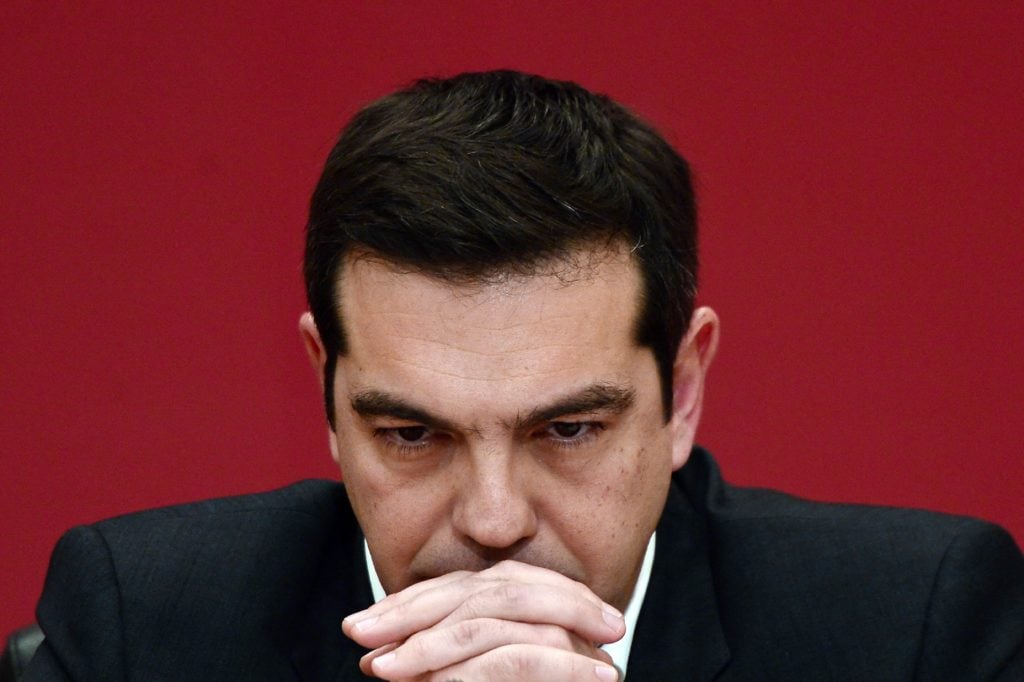
The leader of the leftist Syriza party, Alexis Tsipras, listens to a question during a televised press conference on January 23, 2015 at the Zappion Hall in Athens. (AFP Photo/Louisa Gouliamaki)
The EU seems to have become an endless spinning wheel of crises. If Brussels and the other European capitals have spent most of 2016 trying to get a handle of the migrant crisis and Britain’s referendum, this time last year it was Grexit that was casting a pall on the future of the European project. And yet, twelve months later, the issue that was once billed as “existential” barely warrants more than a passing mention across European media. Unfortunately for the people of Greece, however, this sudden lack of outside interest is not a result of Athens successfully tackling its monumental debt crisis.
Since sweeping to power in January 2015, Alexis Tsipras and his erstwhile radically left-wing Syriza party have begrudgingly pushed ahead with a program of privatization designed to help the country repay its creditors. Having initially vowed to halt plans to sell off strategic public assets shortly after entering government, the party was forced to perform a U-turn at the behest of the European Union and the International Monetary Fund in May 2015.
Reversing their populist (and unrealistic) promises, Greece’s new government announced that it would in fact offload a number publicly-owned assets, including some of the country’s largest ports and airports. Without agreeing to the series of sell-offs, Greece would not have qualified for a tranche of international bailouts and might well have found itself dealing with life outside the Eurozone.
Despite Syriza’s about-face, few of the planned sales have materialized. While the country revised terms for the long-term lease of the old Hellenikon airport in Athens last week, other deals have been thwarted by bureaucracy, mismanagement, and ideological resistance to privatization.
Union opposition to the planned sell-offs have been another hurdle, as has the use of government sites slated for sale being used to house Syrian refugees and other migrants arriving in the country. Only last week, scores of protestors blocked the entrance to the country’s privatization agency offices, demonstrating against the sale of controlling shares in major ports.
On top of all of this, senior members of Tsipras’ government have openly voiced their own criticism of the few privatizations the administration has managed to push through. Responding to the sale of a controlling stake in Greece’s largest port to Chinese state shipping group Cosco in April this year, Shipping Minister Thodoris Dritsas told reporters: “I can’t agree with this sale, which contravenes Syriza’s own policy platform and that of the government.”
Moreover, some privatizations have been reversed, as is the case for the country’s shipyards, which the government is trying to bring under the administration of a single body. However, that has led to legal battles, as is the case of the legal scuffle with Abu Dhabi Mar over the Skaramangas yard.
Last month, Syriza MP Vassiliki Katrivanou resigned after the party announced new austerity measures and the creation of a state privatisation fund. “It is a difficult decision, politically and personally, but one that I felt was necessary,” Katrivanou said. Writing on her Facebook page, the former MP offered what may be the most succinct summary of the ongoing battle between Syriza’s idealist principles and harsh economic realities: “We are adopting measures and policies which run counter to the core of our values and policies, but I cannot think of any credible alternative.”
Syriza’s haphazard implementation of the painful (but necessary) privatization program led to Economy Minister George Stathakis warning in April that revenue from sell-offs would likely only amount to 15 billion Euro, as opposed to the 50 billion once hoped for. Germany was quick to slap down Stathakis, insisting that the 50 billion Euro target must be met under the terms of the program. The sale of Greece’s key public assets faces considerable headwinds from factors outside of Syriza’s control, but the government’s ideological hostility towards foreign investment has done little to aid progress.
The mismanagement of Greece’s asset sales is indicative of poor governance that continues to dog the country’s economy. While European media has been largely looking the other way, politically-connected figures such as Louka Katseli have been appointed to head up Greece’s banks, prompting EU regulators to insist that the government introduce new rules on who can serve on the boards of financial institutions. A law passed in October dictates that anybody who has served in a senior political position over the past four years cannot sit on bank boards.
Syriza’s poll ratings have been heading south for months now, and it is little wonder as to why. The most recent snapshot of voter intention in Greece showed the party trailing the centre-right New Democracy movement by 7.5%. Even worse for the current leadership, fully 75% of respondents said they did not trust the Prime Minister.
Not only has Tsipras’ administration betrayed the voters who backed its anti-austerity manifesto, but it has shown itself to be incapable of implementing the program of reforms its creditors requested. The party is still unable to achieve consensus on its privatization plans and wider reforms among its own ministers, with the central bank chief the most recent to publicly break with Tsipras’ line.
By abandoning the left and demonstrating to the wider public that it is struggling to steer the country’s economy back to stability, Syriza’s popularity is likely to plummet still further. Overall, the muddled sell-off strategy has meant surrendering to neoliberal policies Syriza once fought tooth and claw without recouping the economic benefits.